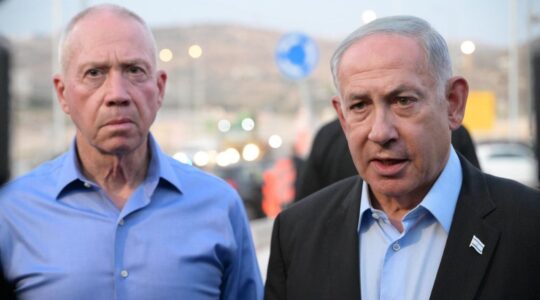Barghouti admitted coordinating West Bank terror attacks, Israeli documents say
(JTA) — Marwan Barghouti, the longtime Palestinian prisoner, coordinated terrorist attacks in the West Bank before his arrest, according to Israeli interrogation documents obtained by Haaretz.
In 2002 Barghouti admitted to encouraging and aiding attacks on Israeli civilians and military personnel in the West Bank with the silent approval of Yasser Arafat, then chairman of the Palestinian Authority. The admissions were made during interrogations by the Shin Bet, Israel’s domestic secutiry agency, shortly after Barghouti was arrested 10 years ago.
On Friday Haaretz published excerpts from Shin Bet memos describing the interrogations as well as from a transcript of one of the sessions. The Israeli daily reported that it did not have access to any recordings of the interrogation sessions.
Barghouti, a member of Fatah, is one of the most popular Palestinian leaders, according to Palestinian public opinion polls. Fatah controls the Palestinian Authority in the West Bank and officially supports the creation of a Palestinian state alongside Israel.
Barghouti reportedly told interrogators that he took full responsibility for Fatah attacks in the territories beyond the Green Line but that he discouraged attacks within Israel’s pre-1967 borders. He also said that Arafat was upset by a deadly shooting attack in Tel Aviv.
Barghouti was arrested on April 15, 2002, and is serving five consecutive life sentences and an additional 40 years for terrorist activity.
During the 2002 interrogations, Barghouti said that while Arafat never explicitly ordered attacks during the Second Intifada, from 2001 to Arafat’s death in 2004, the PA chairman would convey his approval of terrorism.
"There was no need for direct instructions from Arafat," Barghouti said. "Things were understood between the lines. When Arafat would call for a cease-fire, he would convene the heads of Tanzim and instruct them and add that if the cease-fire were to end, they knew what they would have to do, when it was clear to everyone that he was talking about a continuation of military activity."

Help ensure Jewish news remains accessible to all. Your donation to the Jewish Telegraphic Agency powers the trusted journalism that has connected Jewish communities worldwide for more than 100 years. With your help, JTA can continue to deliver vital news and insights. Donate today.





